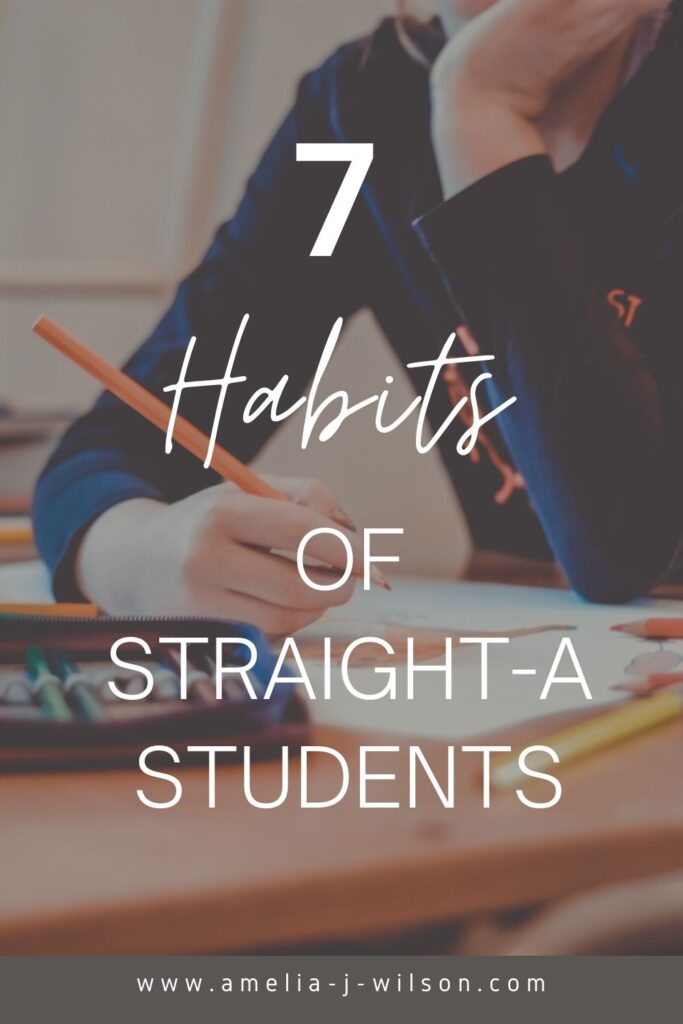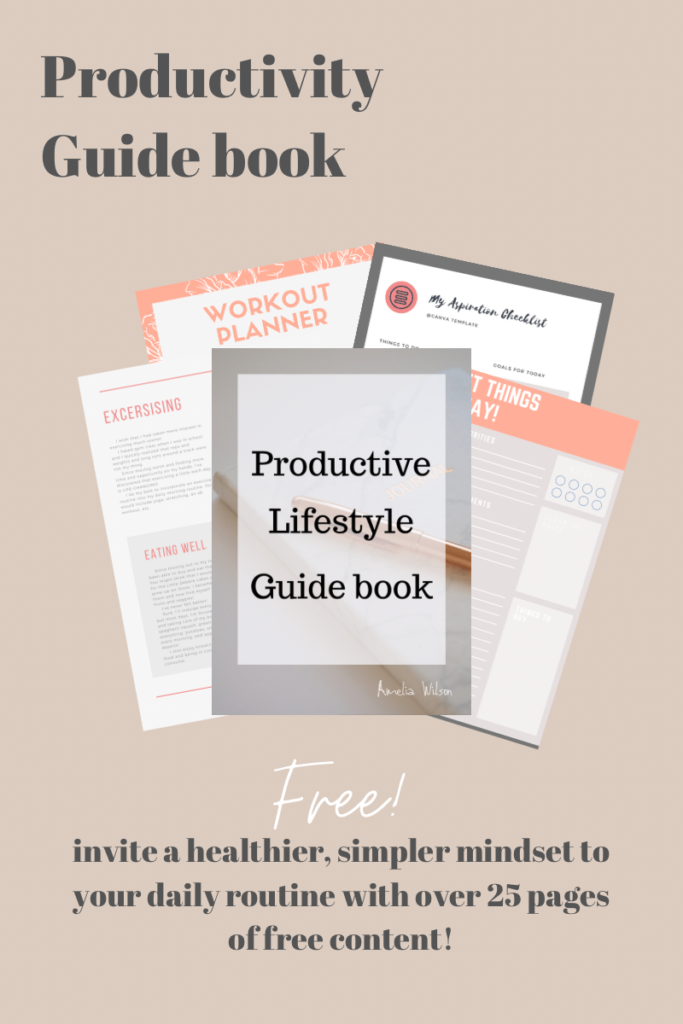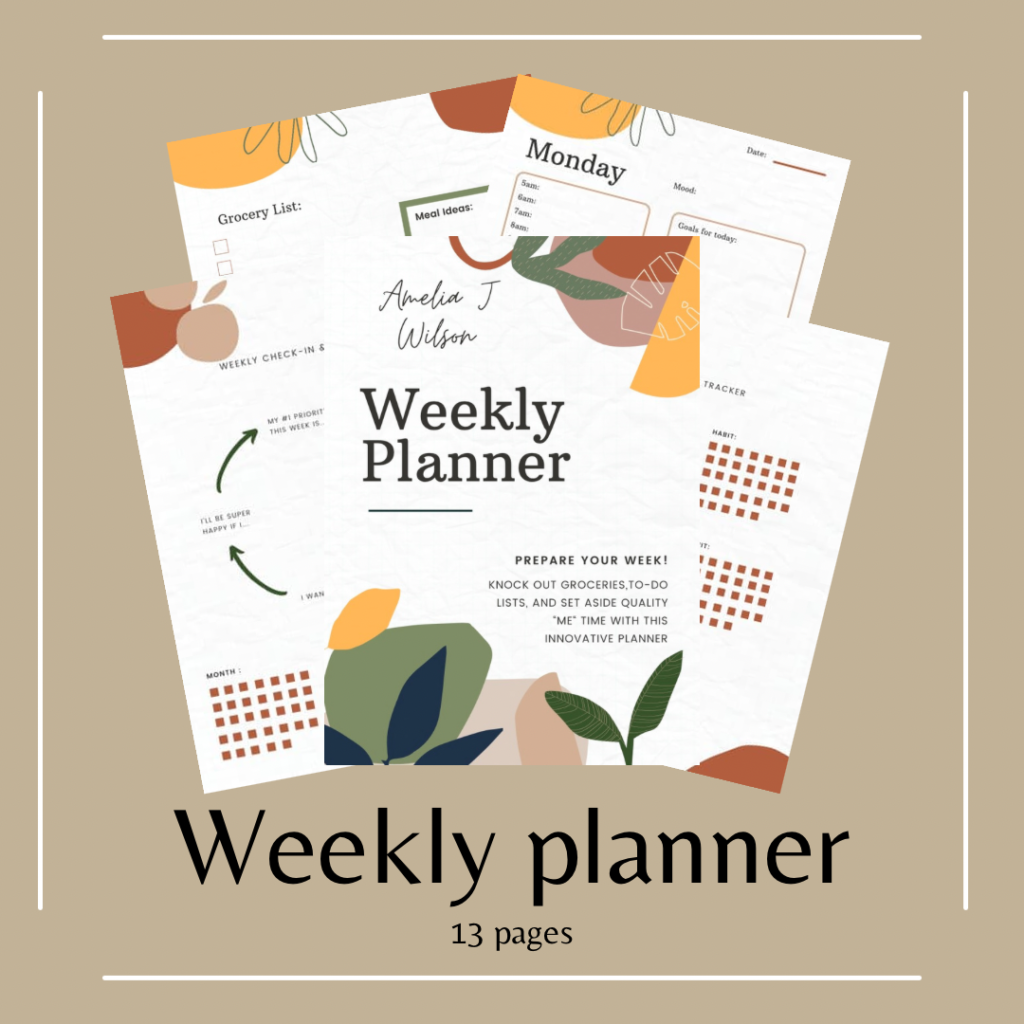If you haven’t read my posts about healthy habits for success or how to set and achieve your goals, I highly recommend that you look into those for additional information.
School is just one segment of your life, and though it’s essential, there’s so much more to your education than what’s in a textbook. I believe the above two posts will help you navigate the tricky waters of life to become the person you truly want to be.
Disclaimer: All of the views and opinions in this post are solely my own and are not sponsored. This post may include affiliate links, meaning I earn a commission through links at no cost to you.

However, that aside, this post will break down seven habits of straight-A students.
How do I know these habits work?
I received straight A’s from kindergarten through college. While the biggest tip for how I did it lies in rote memorization, I also think the following habits made a difference.
1. Take notes twice
One of the most effective habits that helped me in school was taking my notes twice. The first set of notes was taken in class while the teacher gave the lecture, or I fulfilled the required reading.
But the second set of notes is where the magic happened!
At the end of every chapter or lesson (depending on how the class was structured), I would go back and reread all of my notes. Then, I would compile all of the important components into a more legible and organized sheet (sometimes two or three sheets) to better reference important questions and definitions.
Here’s an example:
In calculus, I wrote a “chapter summary” page where I jotted down all of the important formulas, words, definitions, and notes that would help me succeed on the test. I highlighted the most important things and took extra notes on concepts I struggled with. Then, when test time came, I had an easy-to-read cheat sheet to help me study. And this was especially helpful before the AP exam!
Another example:
In English, I had to annotate several books and then perform projects over them. After each book report, I would get out a piece of paper and make my own “SparkNotes-esque” cheat sheet with all of the important quotes, themes, and ideas regarding the book. This revolutionized the way I recalled information at the end of the year and during finals!
Taking your notes twice allows you to weed out unnecessary information and provides room to elaborate on concepts you struggled with. It also helps tremendously to have a perfect cheat sheet ready for each chapter or lesson so that end-of-the-year exams are a breeze to study for.
2. Make flashcards for everything
Some classes are built solely for rote memorization (meaning they’re built on you repeating concepts to memorize them for a test). Foreign language classes are probably the easiest example of this.
I’ve found that flashcards and flashcard programs like Quizlet are highly beneficial for classes built on memorization.
The reason it works is simply that:
REPETITION IS KEY!
Repetition is key.
To retain information in certain classes, the only method of learning is through repetition. Using Quizlet or creating your own flashcards gives you the ability to develop a system of education that forces you to continually repeat the concepts to retain what you’ve learned.
3. Stay organized/ Get a filing system
Not everyone has increased levels of conscientiousness. And that’s okay! Some people are naturally drawn to organization, while others are not.
However, to increase your own productivity and achieve straight A’s in school, staying organized can significantly enhance your educational experience. That’s not to say that naturally messy people can’t earn A’s. It’s possible! But if you are struggling in class, opting for an organizational plan can change your grades around.
Online organization
Online organization is something I took for granted in high school but helped me tremendously in college. In my high school, we had a system that every teacher and student used to organize work by classes.
If your school doesn’t have a system, or you prefer your own method of online organization, that’s totally fine! I have a blog post (written back while I was in school) about online apps that were truly lifesavers. Definitely check that out if you want some recommendations!
However, recently I’ve been using Notion to organize my online work, and I have to admit that it is far more organized and cohesive than my google apps have ever been!
One reason I love online organization is that you can align all of your online assignments, alarms, and schedules in an easy-to-use and accessible way. In addition, you can sync up your phone and computer with the same application that allows you to have your planners digitally from anywhere.
Filing systems
Another method I used in school was a filing system. I went the old-fashioned route and purchased some cheap colored folders and a small file holder. Each folder was labeled and color-coded for its corresponding class. (My notebooks and folders were the same color to make courses easier to organize).
Whenever I was handed back a finished assignment, quiz, test, or other important document, I placed it in its folder. This allowed me to store all of my paperwork in one place where I could easily access and reference it if need be.
Planner/ Bullet journal
While this may be a given, planners and bullet journals are some of the best methods of organization that you can have. I personally use a bullet journal, but I don’t use it in the same way most people use traditional bullet journals.
However, the idea remains the same: jot down important tasks, notes, and dates to ensure you remain on task. Of course, if you prefer to go for a traditional planner, that’s totally fine too! I also have some planners you can look at in my shop if you’re interested or considering purchasing a new one for the next school year!

4. Don’t procrastinate
It can be tempting to leave your assignments alone until the due date approaches, but doing so often leads to unnecessary stress and sometimes all-nighter’s. I can’t lie and say I don’t procrastinate from time to time. However, as my classes became more complicated and I realized I would have to maximize my time better, I began doing my best to avoid procrastination.
Here are a few tips to help you stave off procrastination so that you don’t end up with a pile of work before your deadlines.
- Do your work as soon as you get it and stay on top of homework assignments.
- Use a planner to organize all of your assignments and spread them out when you can.
- Always overestimate your time. Often, we think one hour will be enough for a project, and due to inadequate preparation, we end up staying up all night to finish it.
- Time block your schedule as often as you can. Set aside designated chunks of time for certain classes to make sure the work gets done.
- Don’t let your schedule get overcrowded.
- If it does get overcrowded, ask for help or an extension.
- Do homework in small, manageable chunks. You don’t have to do an assignment for two hours straight. Take breaks and allow yourself room to breathe.
- Always do more significant assignments first.
- If worse comes to worst, cut out small 5pt type assignments. Missing those won’t hurt your grade as much as failing a 20pt quiz.
These are just a few examples of how to beat procrastination, but there are several other ways to go about it. I’ll likely release a blog post soon that dives deeper into this topic.
Additionally, avoiding procrastination all comes down to self-discipline. If you haven’t already, I recommend reading this post that goes into depth on the importance of self-discipline and how you can strengthen your own.
5. Learn outside of class
Being a straight-A student isn’t just about attending class and doing your homework. It’s also about the time and quality of effort you put in. If you really want to improve your grades, involve yourself with learning outside of class.
There are two ways you can consider doing this. First, you can elect to expand on class material to gain better knowledge. Or, you can opt for learning an entirely different subject that interests you.
You might think I’m crazy for that second one! But let’s look at the first option before I elaborate.
Devoting time to expanding upon class material will make you more rounded on the subject and provide you with greater insight. As an example, devoting time to reading and book analysis apart from your assigned books will make you a better speaker, writer, reader. It will hone your abilities to analyze a text with creativity and without too much stress.
In a math setting, expanding on your class topics might mean learning different ways to solve the same problem or taking on additional problems to better your efficiency.
On a completely different note, learning on topics you care about is more enjoyable but doesn’t guarantee immediate success. Unlike expanding your class knowledge, looking up stuff for fun won’t give you instant straight-A’s. However, it WILL make you a more intelligent person in the long run. For the same reasons reading helps increase your intelligence, devoting yourself to outside learning allows you to:
- Become a more effective communicator
- Analyze and understand concepts quicker
- Bring more creativity into your discussions or when solving challenges
- Teaches you a passion for learning
And so much more!
6. Don’t be afraid to ask questions
One thing that I see students struggling with most is being afraid to ask questions. Look, we’ve all been in a situation where we don’t want to look “stupid” in front of our peers. So instead of asking for help or clarification, we keep quiet to avoid judgment.
The thing is, most people don’t really think about the actions of others. Why? Because they’re too busy worrying about themselves and how others will perceive them!
As I’ve grown older, I’ve lost my fear of looking “ignorant” or “dumb” in front of others. As a result, I’ve put more value on my education. And, in all honesty, if I don’t understand something, I’m no longer scared to just ask.
Take time to ask clarifying questions and push the boundaries of your own education to ensure that you fully understand the concepts being presented to you.
7. Find a way to make your classes applicable to you
I’ve heard people tell me they “aren’t good at learning, and that’s why they get bad grades,” but I don’t think that statement is true. I think most people are actually great at learning! The issue is that they don’t like or aren’t interested in what is being taught.
For example, I really don’t like history. I don’t know why, but I hate memorizing all of those dates and names. And I really have a distaste for war. Funny enough, I love learning about ancient Egypt, Mesopotamia, and Sumeria. So, what I actually don’t like is recent history or history that has happened in the last three thousand years.
To become a better student in, say, my US history courses, I’ve discovered that if I make the class content work for my interests, I’ll be more invested and, as a result, earn better grades.
While it’s easy for me to make US history applicable to my life (I live in the United States), other courses like Chemistry and Biology also deterred me. To become interested, I added those concepts into things I like. For example, I used chemistry to help solve weird problems in my WIP novel.
This step can be tricky, but if you can find a way to put the knowledge from the classes you dislike into use for something you do like (make it applicable to you), you’ll find learning more enjoyable. Which, in turn, often leads to good grades!
Bonus: Know your learning style
If you haven’t seen my video on 5 Personality Tests you need to take, you should! Why? Because there is an entire section dedicated to learning styles.
Every person has a different learning style, and this style can influence how well you do in school. The issue with the traditional school system is that it is catered towards reading and writing learners. But several other learning styles are being left out because of how things are taught.
Visual, kinesthetic, and auditory learners are among the few who don’t really get aid when learning. Sure, we have photography, art, gym, and music classes, but those are often considered “extra” and aren’t part of the primary reading, writing, and mathematics curriculum.
I highly encourage you to learn your learning style and adapt your coursework to suit your learning needs. Everyone is different and rote memorization, or writing essays isn’t going to help every individual.

If you like this post, check out some similar posts of mine below!
Feel free to leave a comment below and let me know how you keep up with your grades!
You can also email me with questions or concerns you may have at info.amelia.wilson@gmail.com
My new book, Witch in the Water, is available on Amazon!
Also, check out my poetry book, The Lights are on but Nobody’s Home, available now on amazon for $6.99 in paperback form!
Disclaimer: All of the views and opinions in this post are solely my own and are not sponsored. This post includes affiliate links, meaning I earn a commission through links at no cost to you.
Thanks again


